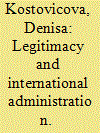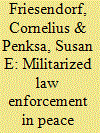| Srl | Item |
| 1 |
ID:
084576


|
|
|
|
|
| Publication |
2008.
|
| Summary/Abstract |
This article explains how the idea of 'impartial' use of force by peacekeepers, first proposed in the Brahimi Report of 2000, has been translated into practice. It first links the report's definition of impartiality to mandates of post-Brahimi operations to identify what impartiality has come to mean in peacekeeping mandates. It argues specifically that impartiality has encompassed two different components of robust mandate implementation and humanitarian protection and that the former has been prioritized over the latter. It then evaluates these two components in the light of peacekeeping experiences in Sierra Leone and Haiti.
|
|
|
|
|
|
|
|
|
|
|
|
|
|
|
|
| 2 |
ID:
084583


|
|
|
|
|
| Publication |
2008.
|
| Summary/Abstract |
In February 2006, the United Nations Interim Mission in Kosovo (UNMIK) 'nationalized' the Kosovo ombudsperson's institution. This entailed making the ombudsperson a Kosovar and removing oversight of UNMIK from his/her jurisdiction. Based on legal and political analysis, and fresh survey results on the views of Kosovars themselves, this article considers the prospects of the ombudsperson as a human rights accountability mechanism. It also considers the implications of the nationalization experience for peace operations generally, arguing that UNMIK has established a poor precedent in isolating itself from the ombudsperson's jurisdiction and in failing to put anything comparable in its place.
|
|
|
|
|
|
|
|
|
|
|
|
|
|
|
|
| 3 |
ID:
084579


|
|
|
| 4 |
ID:
084581


|
|
|
|
|
| Publication |
2008.
|
| Summary/Abstract |
Legitimacy is recognized as critical to the success of international administrations in their efforts to build and promote peace, stability and welfare in post-conflict territories. Nonetheless, scholarship on statebuilding is dominated by the 'managerial' approach, which offers a top-down analysis of policies by international actors and their impact on local constituencies. With its focus on the grass roots, the individual and a multiplicity of concerns, a human security perspective on international administration can identify and address their legitimacy gap, resulting in strategies for more effective conflict resolution. The argument is illustrated by analysis of the Ahtisaari process and plan for Kosovo's final status.
|
|
|
|
|
|
|
|
|
|
|
|
|
|
|
|
| 5 |
ID:
084587


|
|
|
|
|
| Publication |
2008.
|
| Summary/Abstract |
The militarization of law enforcement has been a major feature of post-cold war international security: domestically, at borders and as part of peace operations. In post-war interventions, international military forces are confronted with tasks ranging from crowd and riot control and the arrest of suspect war criminals to the fight against organized crime. This article analyses and explains the militarization of law enforcement in Bosnia and Herzegovina, with a focus on the European Union Force (EUFOR). After taking over from NATO's Stabilization Force (SFOR), which had gradually and reluctantly become involved in law enforcement, EUFOR expanded counter-crime efforts. In its second term, EUFOR scaled down such engagement. We explain these dynamics by pointing to three interrelated factors: the role of individuals, the evolution of regional institutions and changing perceptions of crime and the rule of law.
|
|
|
|
|
|
|
|
|
|
|
|
|
|
|
|
| 6 |
ID:
084585


|
|
|